[dropcap]A[/dropcap]n air of anguish and trauma pervaded the palace of His Royal Majesty, Asagba (Prof) Chike Edozien, the Asagba of Asaba, Delta State, weekend, as journalists and other guests listened to the shocking reminiscences of Asaba genocide which occurred in the early months of the Nigerian Civil War.
The occasion was the World Press Conference to kick-start activities marking the commemoration of 50th anniversary of Asaba genocide, titled “Asaba October 7 Memorial” – scheduled for October 5th to 7th in Asaba, Delta state capital.
Clad in their ceremonial white woven regalia, palace chiefs, key traditional heads and other title-holders took turn to relate the horrific event of October 7, 1967 when Nigerian soldiers systematically mowed down over 700 menfolk of the community in one swoop.
The federal troop had liberated Asaba which was captured by the Biafran soldiers who had made fierce advancement into the hinterland as far as Ore in present Ondo State, having overrun Benin-City, then Mid-West Region capital, before they were forced to retreat.
According to the locals, the federal troops that entered Asaba on October 5, accused the community of being Biafran sympathisers and descended bitterly on them by going from house to house, looting, raping the women and shooting the men on the spot or gathering and killing them in groups.
The Nigerian soldiers were said to have accused the community of co-operating with the Biafran soldiers and providing them with logistics that aided their rapid advancement into the West, and quick escape back to their territory.
It was learnt that in a show of solidarity, the indigenes trooped out of their homes in the late morning hours of October 7, 1967, on the order of their local leaders through the Town-Crier who had disseminated the message the previous night.
They said the military officers had warned against any adult staying back at home during the town square meeting at which the Asaba elders, clad in their white regalia – a symbol of peace – had planned to reassure the federal troops of their people’s loyalty and to maintain peace.
According to a palace Chief, Cyprain Ngozi Allana, a medical doctor in his advanced age, the troops began to remove the women and small children as they approached the venue for the meeting.
The men and young boys of about twelve were taken to a side, shortly arranged in groups of 10 on the order of an officer, Col. Ibrahim Taiwo, and systematically mowed down in the presence of their family members at the Ogbe-Osowa square.
“The machine guns mounted on trucks and other locations were revealed to the men who realized at that point that the forum was a gathering of death; the killing was like a movie tale” Allana said, as he became overwhelmed by emotions and could not continue with the narrative and had to be cuddled away by his fellow chiefs.
“We the people of Asaba Kingdom have decided to collectively come out and tell the world the story of our unfortunate and sad tragic experience of 50 years ago which has left many of our people badly traumatized”, said Chief Patrick Goodluck Onyeobi, the Iyase (Traditional Prime Minister) of Asaba, who stood in for Asagba Edozien said to be on a medical trip abroad.
Onyeobi, who spent 20 months in detention after the Civil War on various trump-up charges of supporting Biafra, advised that government must operate on the platform of equal justice to prevent circumstances that could make Civil War an attractive choice.
Warning that Nigeria’s sensitive structure must not be mishandled to avoid another Civil War experience, Onyeobi stressed the importance of good governance on the platform of justice, noting that the love for Nigeria was the reason for the Asaba genocide story being narrated at this time.
He said, “We are telling the story because we dearly love our country Nigeria and want it to remain united and indivisible.
“We would not like the same mistake that led us to the unfortunate Nigerian Civil War (1967 – 1970), which produced the Asaba massacre of October 7, 1967, to be repeated so that History does not condemn us – particularly the present generation of leaders of our country as history has done the Bourbons of France who History recorded as having ‘learnt nothing, forgotten nothing and mastered nothing from their History’.
“We must strive to evolve a system of government that guarantees justice to all – ‘Justice’ – as the Greek Philosopher Plato defined it to mean ‘giving each man his due’.”
The Traditional Prime Minister said the activity components of the event were designed to serve as constant reminder about the futility of war as the community seek the co-operation of world leaders towards achieving global peace and justice.
“We ask for the full support of the global community towards the realization of the goals of Asaba October 7 Massacre Memorial programmes which will be formally rolled out in the next few days and will be a constant reminder to our people and the world of the futility of wars and the need for justice to all”, he said.
Giving more insight into the three-day event, Chairman, ‘Asaba October 7 Memorial Group’, Alvan Ofili Okonkwo, explained that the 50th anniversary of the genocide would provide the opportunity to erect monuments to preserve the history of the tragic incident.
According to him, a world-class hospital and maternity will be built at the location of the massacre to be named, ‘My Place of Birth Hospital & Maternity’, to serve as symbol of life and not death.
He disclosed that a world-class college of Midwifery is also proposed at Ogbe-Osowa to train health workers to acquire advanced expertise in their profession of saving lives.
Okonkwo said the facilities will be open to all Nigerians and citizens of all nations across the globe.
According to him, the challenge of grappling with the traumatic memories of the horrible incident was the major reason it took 50 years to institute the Memorial.
“The wound is still fresh. We are yet to recover from the shock; yet, we believe it is time to tell our story and strengthen ourselves to move forward. We are mourning the past, but celebrating our present.
“We forgive those who perpetrated these atrocities against us, but we will never forget. That is why we want to erect a monument of life – a world-class hospital and maternity with an outstanding college of Midwifery,” Okonkwo said.
He said that the first day of the event will be devoted to traditional activities that will shake the land for the dead to know they are not forgotten.
“We want this land to shake in such a way that the dead will feel it and know that they left people behind and that they are not forgotten and will never be forgotten.
“Until we mourn openly, the trauma will not be assuaged,” he said in answer to Journalists’ questions and why it took 50 years to commence ‘Asaba October 7 Memorial’.
He however stressed that the occasion was not meant to question the rationale for the Civil War, nor does it align with the clamour for cession or break-up of the country; but to scrutinize the conduct of government agents that executed the genocide.
Okonkwo further revealed that a Memorial Colloquium would be held on October 6, to be attended by prominent scholars and personalities from within and outside Nigeria, who are billed to speak at the occasion.
These include, Nobel Laurette Prof. Wole Soyinka; Bishop Matthew Hassan Kukkah of Catholic Diocese of Sokoto; President-General, Ohanaeze socio-cultural organisation, John Nnia Nwodo; John Odigie-Oyegun, Chairman, All Progressive Congress (APC); Senator Ike Nwachukwu; representatives of Fourth Foundation.
Donald Duke, former Cross River State governor will chair the occasion during which a publication, “The Asaba massacre and the Nigerian civil war: reclaiming hidden history”, a Journal of Genocide Research by S. Elizabeth Bird and Fraser Ottanelli, Professors of Anthropology and History respectively at University of Florida, USA, will be unveiled with both authors present.
Sam Diala is a business editor at All News and Reports where this article was first published.
The opinions expressed in this article are solely those of the author.











